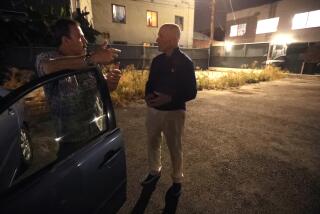Moscow’s Casualties of Winter
MOSCOW — On the longest night of his life, Alexander N. Dunayev lay on a bleak stretch of snow beside a railway track through the lonely hours of darkness. At some point, cunning fingers slipped into his jacket to steal his wallet and documents. As the night wore on, Moscow’s temperature dropped to 18 below.
At home in the city’s Khovrino district, Irina K. Dunayev waited for her husband and worried. The 42-year-old television engineer and father of two had called from the Khovrino station at 8:10 p.m., sounding sober and his usual self, and promised to take the quick path home along the railway line. It was a 10-minute walk, but he never arrived.
Police later told Dunayev that her husband died of hypothermia, probably the next day, Feb. 3, about 9 a.m.
“He was just lying there dying, and nobody helped him. It is impossible that nobody passed that way,” said Dunayev, a tall woman with dark eyes rimmed red with raw grief. “My heart is breaking to think about him lying there all night in that terrible frost. Maybe somebody passed by and didn’t do anything, thinking he was a drunk or something. He must have been very lonely and miserable in his death.”
Death is a wintry companion in Moscow. Last year alone, 557 people froze to death on the city’s streets, in just an average year for hypothermia. News bulletins record these deaths almost as an afterthought, dropping in the winter casualty list with all the ease of a weather report--and there is little evidence of official alarm.
Among the reasons these deaths raise so little public concern here are the popular myth that most of the dead are homeless people, the bomzhi, and the reality that most victims are drunk before they die. The police who pick up the bodies share the prevailing contempt for those who freeze on the streets--the view that decent people do not die this way.
The families of those who freeze to death often are confronted by official prejudice. On the night her husband failed to return home, Dunayev, 39, called the police many times, frantic for news. When the police got sick of her calls, they hung up on her. A cruel and bizarre regulation meant she found out nothing until her husband had been officially missing for three days--though police found him at 10 the next morning.
“I realize now that it’s no use calling the police at a time like this,” she said. “All they say is ‘We don’t know.’ ”
Dunayev can only guess at her husband’s fate. Police said it was not yet clear whether alcohol was involved, but she thinks not. She says her husband had slipped on black ice a week earlier and cracked three ribs. She believes that he fell again and was unable to get up because of the pain.
Despite the number of hypothermia deaths in the Russian capital, the official attitude is offhand, perhaps because 74% of the fatalities do involve vodka, according to figures from Moscow’s Department of Forensic Medicine.
“The situation with people who freeze in the streets is not that terrible because mostly these people were drunk when they froze,” said Nikolai M. Kudinov, a senior official at the city’s Social Protection Committee specializing in homelessness.
Every large city has its homeless. In Moscow, the plunging winter temperatures and the limited shelters for homeless people leave these indigents particularly vulnerable to hypothermia.
To Homeless, Freezing Can Seem Inevitable
When Nikolai A. Sukhorukov, 42, reached into the voluminous folds of a grubby overcoat to draw out a small icon of the mother of God as protection against the winter’s wrath, it was a moment that hooked the heart. Shirtless, with neither socks nor gloves, Sukhorukov sheltered from the cold in the Arbatskaya Metro station one recent winter night.
Answering uncomfortable questions about a life of homelessness, he admitted his fears. Two of his homeless acquaintances froze to death, and he believes he will join them.
“I’ll end up as a corpse in the street for sure,” he said. “I don’t want to die like a dog in the street.”
He cradled the little icon, muttering that he hoped God would protect him. On one of his legs was a large ulcerating sore. His fingernails were black, but his fingers were delicate.
Most Russians believe that the hypothermia victims are for the most part men like Sukhorukov: bomzhi, none of whom has the official registration document that would prove he is a resident of Moscow.
But professor Vladimir V. Zharov, chief of the Department of Forensic Medicine, says his agency’s statistics show that only 40% of people who froze to death in the streets last year were homeless. The rest consisted mostly of those who drank too much and could not find their way home.
The problem stems largely from the huge role vodka plays in Russian culture.
“We sometimes have very intelligent, professional people who die,” Zharov said. “It’s a friendly get-together or banquet. A person has had way too much to drink, and he’s on his way home. He feels very warm, but it’s an illusion. He decides to sit down in a snowdrift for a rest. And he dies. Unfortunately, that’s life.”
Despite the official numbers, Sgt. Pyotr Kalyakin, who patrols the streets in a chunky little car picking up the dead and dying, insists that 99% of the frozen bodies found are bomzhi. Cruising central Moscow one recent night searching for winter’s victims, Kalyakin did not disguise his contempt for the job of collecting people found dead or half-dead from the cold.
“It’s basically like putting the garbage out for someone else,” he said. “We usually carry a pair of gloves to get their documents.” For those still alive, “the rest of the operation is performed with a truncheon.”
When he finds a freezing person who is close to death, he never puts the victim in the back seat of his police car.
“There are cases where we put a bomzh in the trunk and carry him that way,” he said. “We don’t have the right to put him in the car because if he died we’d be in trouble. There are standard rules that regulate the procedure of apprehending a person.”
Kalyakin said frozen bodies that are found without identifying documents and registration are the lowest priority for police. A morgue attendant who requested anonymity said it is pointless to try to identify frozen corpses because they are nearly all bomzhi.
On the most desperately cold nights, the homeless gravitate to police stations, begging to be taken in.
“They’re usually allowed to stay inside for two or three hours, and then they get chased out,” Kalyakin said. “I’ve already explained that dealing with these people is a real headache.”
When Kalyakin came across Grigory Nasredinov at 11 p.m. during his patrol, the 44-year-old was wandering lost along Presnensky Val in central Moscow, heading away from the Metro station that he was trying to find. Though not a bomzh, Nasredinov had no money for a ticket home. He had spent several hours in a police sobering-up station but had just been evicted.
Clad in a thin jacket, Nasredinov shivered so violently that his tremors cast doubt on the wisdom of turning him out into the street, confused, so late on a cold night. He had drying blood on his jacket, a bandage on his forehead and a shiny bruised nose. He claimed that he had fallen and that police had beaten him.
He was not heading back to a happy home. He swore at the mention of his wife, who he said was bound to pick a fight. Sometimes when he gets home drunk she locks him out, he said, and forces him to sleep in the stairwell. As Nasredinov ambled on his way in drifting snow, Kalyakin declared him likely to freeze to death.
“If he walks home instead of taking the Metro, he’ll freeze,” Kalyakin said. “He’s dressed very lightly. He’s getting over a hangover, and even a glass of vodka would knock him out for a long time.”
Post-Soviet Spike in Hypothermia Deaths
According to city authorities, there was a big spike in homelessness--and hypothermia deaths--in the early 1990s after the Soviet Union collapsed, but now the situation has stabilized.
The city government does not attribute homelessness to a housing shortage but to migration from other areas of Russia or former Soviet republics. Hence, a key part of the city’s policy on the issue involves monthly police raids to round up the homeless and take them to reception centers--jails with appalling conditions on the city’s outskirts--where they are held for up to 30 days before being driven to the nearest railway station to be sent out of Moscow. Kudinov, of the Social Protection Committee, said about 15,000 people a year are processed through the reception centers.
“The city has to look hygienic and clean,” Kudinov said. It is an offense to be without residence documents, he said, labeling a large percentage of bomzhi criminals from outside Moscow.
Kudinov pointed with pride to homeless shelters that the city has built in the last few years and that include 1,500 beds in six special facilities. At any time, he boasted, each of those facilities has seven to 10 vacancies--in a city where thousands of homeless comb garbage bins and creep into basements or stairwells to avoid freezing.
The reason for the vacancies is simple: Those who, like most of Moscow’s homeless, have no registration documents and are not “socially rehabilitated,” said Kudinov, are turned away from these special shelters, no matter how cold the weather.
“Without documents, they could give you any made-up name,” Kudinov said. “We don’t admit them. We tell them to go to the police.”
But, other than sobering-up tanks and reception centers, the police have nothing to offer the homeless.
Sgt. Kalyakin speaks as though Moscow is at war with its homeless. “When they get into basements, it becomes a war between the first-floor residents and the bomzhi,” he said, pointing out a basement ventilator welded shut to keep homeless people out.
Sukhorukov, the homeless man, is familiar with these tactics. He knows the tricks to keep warm: Creep into a stairwell and climb to the top where the warm air is.
He knows the risks too. He said someone once sprayed him with a canister of noxious gas. He has been beaten, kicked and abused by people who have found him in their stairwells.
The trick, he said, is to avoid the police and their reception centers, to keep to yourself, to find a different stairwell every night and to start drinking only after you have found a warm place to sleep.
The ‘Freedom’ of Being on the Loose
At first, being homeless made him feel liberated from life’s drudgery. “It gives you an impression that you’re free to go where you like and do what you want,” he said. “But it’s a very deceptive impression because you are dependent on so many little things in your life that you never would have thought about in your previous life.”
Thinking of the future, he sighed and said there is always hope.
“When hope runs out, life will end,” he said. “I don’t want to die young.”
But in his eyes, there was no hope.
Alexei Kuznetsov of The Times’ Moscow Bureau contributed to this report.
More to Read
Sign up for Essential California
The most important California stories and recommendations in your inbox every morning.
You may occasionally receive promotional content from the Los Angeles Times.










